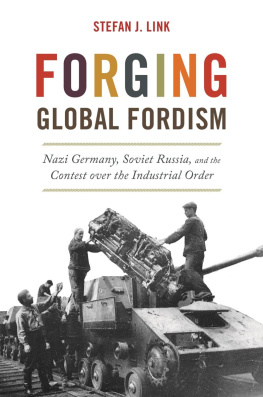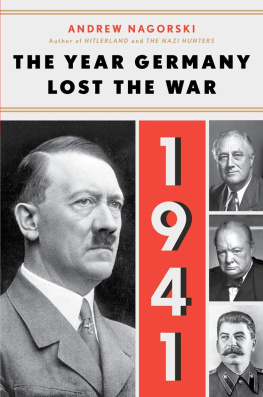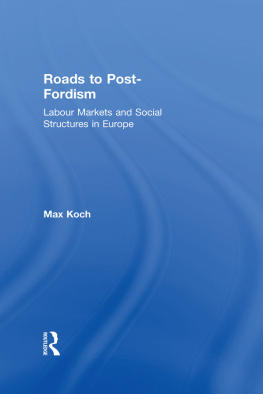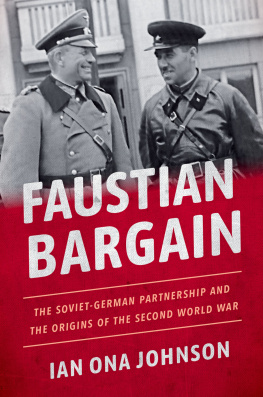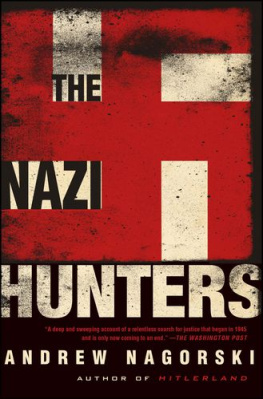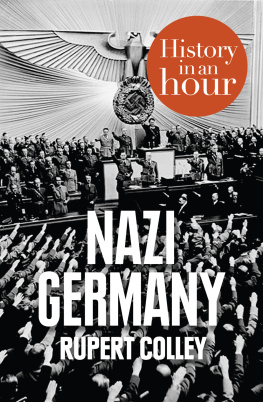FORGING GLOBAL FORDISM
AMERICA IN THE WORLD
Sven Beckert and Jeremi Suri, Series Editors
Stefan J. Link, Forging Global Fordism: Nazi Germany, Soviet Russia, and the Contest over the Industrial Order
Sara Lorenzini, Global Development: A Cold War History
Michael Cotey Morgan, The Final Act: The Helsinki Accords and the Transformation of the Cold War
A. G. Hopkins, American Empire: A Global History
Tore C. Olsson, Agrarian Crossings: Reformers and the Remaking of the US and Mexican Countryside
Kiran Klaus Patel, The New Deal: A Global History
Adam Ewing, The Age of Garvey: How a Jamaican Activist Created a Mass Movement and Changed Global Black Politics
Jrgen Osterhammel and Patrick Camiller, The Transformation of the World: A Global History of the Nineteenth Century
Jeffrey A. Engel, Mark Atwood Lawrence, and Andrew Preston, editors, America in the World: A History in Documents from the War with Spain to the War on Terror
Donna R. Gabaccia, Foreign Relations: American Immigration in Global Perspective
Thomas Borstelmann, The 1970s: A New Global History from Civil Rights to Economic Inequality
Rachel St. John, Line in the Sand: A History of the Western U.S.-Mexico Border
Ian Tyrrell, Reforming the World: The Creation of Americas Moral Empire
Andrew Zimmerman, Alabama in Africa: Booker T. Washington, the German Empire, and the Globalization of the New South
For a full list of titles in the series, go to https://press.princeton.edu/catalogs/series/title/america-in-the-world.html.
Forging Global Fordism
NAZI GERMANY, SOVIET RUSSIA, AND THE CONTEST OVER THE INDUSTRIAL ORDER
STEFAN J. LINK
PRINCETON UNIVERSITY PRESS
PRINCETON & OXFORD
Copyright 2020 by Princeton University Press
Requests for permission to reproduce material from this work should be sent to permissions@press.princeton.edu
Published by Princeton University Press
41 William Street, Princeton, New Jersey 08540
6 Oxford Street, Woodstock, Oxfordshire OX20 1TR
press.princeton.edu
All Rights Reserved
ISBN 9780691177540
ISBN (e-book) 9780691207988
Version 1.0
British Library Cataloging-in-Publication Data is available
Editorial: Eric Crahan and Thalia Leaf
Production Editorial: Natalie Baan and Leslie Grundfest
Jacket Design: Layla Mac Rory
Production: Danielle Amatucci
Publicity: Alyssa Sanford and Amy Stewart
Copyeditor: Jennifer McClain
Jacket photo: Workers assembling a T-70 tank at Gorky Automobile Factory, 1942. Courtesy of Central Regional Archives, Nizhnii Novgorod, Russia
To Gaby and Solne, with love
CONTENTS
FORGING GLOBAL FORDISM
Introduction
DETROIT, CAPITAL OF THE TWENTIETH CENTURY
Nineteenth-century civilization has collapsed.
KARL POLANYI, THE GREAT TRANSFORMATION , 1944
WHEN REFORMERS and radicals of the 1930s described the contours of the future, they invoked the twentieth century. In doing so, they meant to repudiate the principles of the preceding era. The nineteenth century had been the age of liberalism, but the twentieth would be a postliberal era; the nineteenth century championed individualism, but the twentieth would be the century of the collective, of the people and of space; if the nineteenth century was the era of laissez-faire, the twentieth century would be the era of economic dirigisme. In exemplary fashion, Mussolini performed this incantation in his 1932 treatise The Doctrine of Fascism, in which he attacked liberalism, individualism, and democracy as outgrown ideologies of the nineteenth centuryideologies rejected by the great experiments in political and social transformation now everywhere under way. In their place would rise the twentieth, a century of authority, a century tending to the right, a Fascist century.
Not only fascists saw a new century dawning in the Thirties. John Maynard Keynes employed the notion in one of the key texts of his long intellectual transformation from classical liberal to leading theorist of state intervention. In the 1933 essay National Self-Sufficiency, Keynes wrote:
It is a long business to shuffle out of the mental habits of the prewar nineteenth-century world. But to-day at last, one-third of the way through the twentieth century, we are most of us escaping from the nineteenth; and by the time we reach its mid point, it may be that our habits of mind and what we care about will be as different from nineteenth-century methods and values as each other centurys has been from its predecessors.
Keynes considered in this essay the failure of the old internationalism to preserve peace and confessed his newfound willingness to honor deviations from the principles of economic liberalism and free trade. He also expressed his sympathy with the spirit, if not always with the practice, of the new politico-economic experiments that shaped the new international scene.
Exiled in Paris, Walter Benjamin evoked a similar sentiment when he summoned the lost world of the nineteenth century in his Arcades Project. To Benjamin, Paris was the capital of the nineteenth century. Its architecture reflected the rise of the bourgeoisie and the seductive triumph of the commodity form. The arcades of Paris expressed the culture of circulation, the citys world exhibitions the international sweep of the market, and its opera houses and museums the cultural sensibility of the commercial bourgeoisie. Writing in a dialectical spirit, Benjamin perceived in the bourgeois aesthetics of Paris glimpses of a future collective salvation. But in the 1930s, as Benjamin sensed only too keenly, the aesthetics of the nineteenth centuryand with them the hope of salvationcrumbled around him.
As Benjamin walked the streets of Paris, nostalgic for the promises of a bygone era, others turned away from the artifacts of commercial capitalism and trained their sights on the centers of industrial production. Port cities and commercial entrepts may have been the metropolises of the nineteenth century, but the city most representative of the modern age was landlocked, and its iconic industry was as young as the new century itself. In the smokestacks and assembly lines of Detroit, in the din of the motor factories, where whirring conveyors laced together the bustle of thousands of workers, engineers and travelers from across the world glimpsed an image of the future. Seeking to exorcize the nineteenth century, the activists of Keyness politico-economic experiments converged on the American Midwest and anointed Detroit the capital of the postliberal twentieth century.
When it came to developing fresh principles after the bankruptcy of the old economic order in the global crisis of the 1930s, it was Detroit that drew all modernizers of postliberal persuasion, left and right, Soviets and Nazis, fascists and socialists. To be sure, uncounted engineers and admirers had come to see Fords factories since the 1910s, when the old Highland Park, forge of the Model T, was first equipped with an assembly line. Yet in the 1930s Fords new factorythe much expanded, vertically integrated River Rougebecame the destination of engineering delegations bent on wholesale technology transfer. Italian, German, Russian, and Japanese specialists traveled to Detroit, spent weeks, months, even years at River Rouge to learn the American secret of mass production. With the Gorky Automobile Factory (Gaz) in central Russia, the Soviet Union opened its own River Rouge in 1932. In 1938, Hitler laid the cornerstone of the Volkswagen works. Nor were Nazis and Soviets alone. Toyota began operating its Koromo plant in 1938, and Fiat welcomed Mussolini for the opening ceremony of the brand-new Mirafiori facility in 1939. As is easily seen, these Depression-era exchanges laid the groundwork for the infrastructure of global Fordism after World War II.

